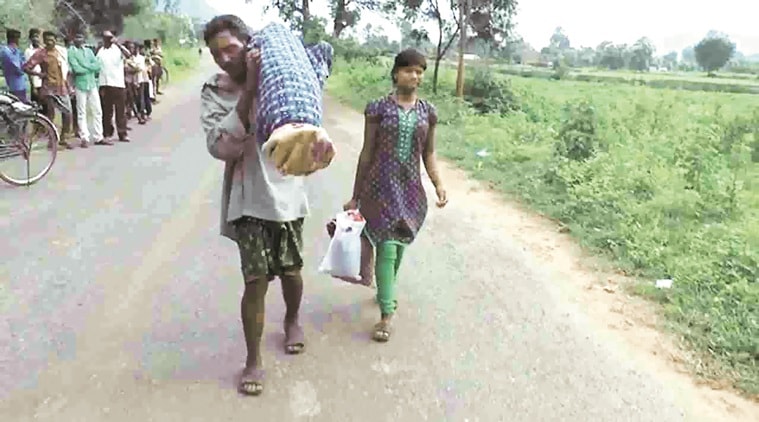Stay updated with the latest - Click here to follow us on Instagram
Months after Dana Majhi case, Odisha issues norms for carrying bodies
In the guidelines, the health department has said that a body should not be allowed to be carried on shoulders, or strung on a pole, or carried in any manner that compromises the dignity of the dead.
 On August 24, Dana Majhi, a resident of Melghar village in Kalahandi district, had carried his wife’s body on his shoulder and walked 10 km accompanied by his minor daughter after allegedly being denied a hearse by the district hospital.
On August 24, Dana Majhi, a resident of Melghar village in Kalahandi district, had carried his wife’s body on his shoulder and walked 10 km accompanied by his minor daughter after allegedly being denied a hearse by the district hospital.
More than a month after tribal farmer Dana Majhi had to carry the body of his wife on his shoulders from Kalahandi district headquarters hospital after being denied a hearse van, the Odisha government Wednesday came up with specific guidelines on transportation of bodies from hospitals.
In the guidelines, the health department has said that a body should not be allowed to be carried on shoulders, or strung on a pole, or carried in any manner that compromises the dignity of the dead. The body should be carried on a stretcher or cot and kept appropriately in a designated place till all formalities are completed.
Watch What Else Is Making News:
The guidelines would also apply in medico-legal cases or if the body is unclaimed.
For medico-legal cases, the government will provide police stations with funds for transport of dead bodies will be provided to all police stations. While police stations in urban and rural areas will be provided Rs 1,000 and Rs 1,500, respectively, they will be given Rs 2,000 in special cases.
In cases where the family asks for a carrier, the district collector should provide funds up to Rs 2,000.
The guidelines also say that regular meetings should be held to ensure that the family receives help in transportation of dead bodies and completion of last rites.







